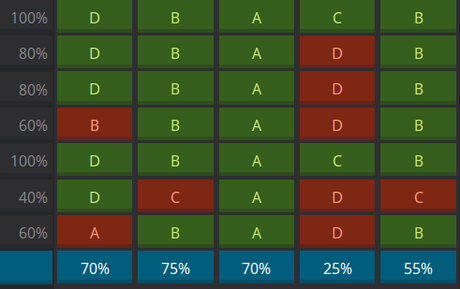1. I used Socrative for my ACT practice. I've written about this before, and mentioned the fact that this is something I am required to do. But Mastery Connect, who acquired Socrative, has made some neat changes to Socrative that I find very useful. Specifically, I love the new monitoring screen, where you can see student results in real time. Before I could only see student progress in terms of how many questions they had answered. Now I can see what students are answering and what questions they are getting incorrect.
 When I last used Socrative for this, I could only see what students got incorrect after I got the report from the session emailed to me. As you can see, it posts total percent correct for each question at the bottom as students are putting in their answers-this tells me immediately what questions I need to review with the class and which ones I do not. Talk about immediate feedback.
When I last used Socrative for this, I could only see what students got incorrect after I got the report from the session emailed to me. As you can see, it posts total percent correct for each question at the bottom as students are putting in their answers-this tells me immediately what questions I need to review with the class and which ones I do not. Talk about immediate feedback.2. Positive student feedback about my use of RAFTs. I wrote yesterday about assigning a RAFT for my Biology students to synthesize cellular concepts we are studying. At the start of my 2nd period class, when I asked students to turn in their homework, a lot of students remarked at how fun it was to write the RAFT. One even apologized for hers running a little long because she got so involved. Now I can't wait to read them all.
3. My scoring system is working itself out slowly but surely. I'm using my version of SBG in all of my classes this year, even my AP Environmental Science. Some students aren't too pleased with it, others mock it, but most students (and parents) are digging it, mainly because it doesn't seek to punish with points - it seeks to reveal what level of understanding students are at. The challenge I had this year was that, as a department, we have weighted categories for things like labs, final exam, and participation (something that I do not agree with giving students scores for). Before this year I had put all of my I can statements in the gradebook in one large category; now I had to figure out how I was going to adjust my system to account for these weighted categories.
For the participation category, I decided to write I can statements based on these 8 workplace skills. It was harder to decide what to do about the labs, until I realized I would need to write lab-specific I can statements for each unit and, instead of placing them in the category where the content I can statements were located, I could place them in the lab category. For example, in my Environmental Science classes, we are about to work on measuring biodiversity using biodiversity indices, and I already had an I can statement written concerning this skill. Instead of putting it in with my content objectives, I simply moved it to the lab category. A small decision, but one that I needed to make in order to make my scoring system jibe with how my current department operates.
These wins are very, very small, I know, but I feel it's important to recognize these instead of always dwelling on the negative - something this teacher who is new to her district too often does these days.
